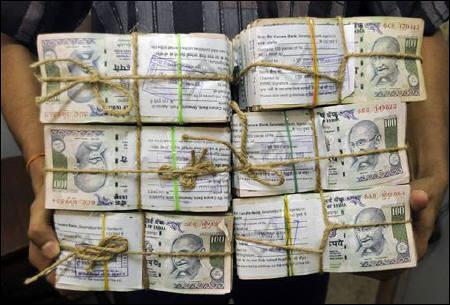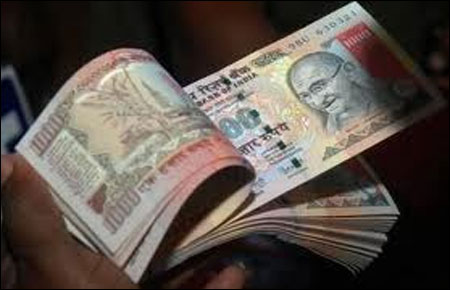Photographs: Jayanta Dey/Reuters Anjani Kumar
A small change in the Income Tax Act from 'total income' to 'gross total income' can make a big difference in containing black money
Black money affects both the gross domestic product (GDP), the total value of goods and services produced in an economy, and tax revenue. Where transactions are recorded but tax is not paid, GDP figures may not be impacted.
But when the transactions are not recorded or manipulated, GDP is suppressed and tax revenue depressed. The term "parallel economy" refers to such unrecorded transactions. Are there ways to bring this "parallel economy" into the mainstream?
Consider, first, the magnitude of the problem. There are various estimates of black money in India. The National Institute of Public Finance and Policy estimated it at 18 to 21 per cent of GDP in 1981. A study commissioned by the government last year estimated it at above Rs 10 lakh crore or 10 per cent of GDP. A Business Standard report (January 13) estimated it at 30 per cent of GDP, or Rs 28 lakh crore.
The report of the Global Financial Integrity of November 2010 titled "The Drivers and Dynamics of Illicit Financial Flows from India: 1948-2008" estimated that India has lost during this period $462 billion (Rs 25 lakh crore) owing to illicit flows.
But what is of greater concern is the observation that while the "underground economy" pre-reform (1948-1990) was 27.4 per cent, post-reform (1991-2008) it was 42.8 per cent.
Click on NEXT for more...
How a small change in I-T Act can curb black money
Photographs: Jayanta Dey/Reuters
When incomes of rich people grow, part of it also trickles down to lower-income people, either through their ostentatious expenditure or the creation of ancillary industries and supporting services.
But a large part of the receipts by these lower-income people are not recorded. Look at the incomes of paan vendors outside five-star hotels, taxi owners, entertainment organisers, et al.
These people, in turn, buy jewellery, land, flats and other assets, transactions that are not recorded, partly or wholly. Thus, such receipts get absorbed in unrecorded investments and it is partly for this reason that the "underground economy" post-reform has swelled.
Therefore, the priority in tackling the menace of black money should be to bring on record all such transactions. Once the transactions are recorded, the figures of not only GDP but also revenue will increase. If people receiving income of, say, Rs 100,000 disclose their transactions, those with whom they invest would have to disclose their transactions in turn.
Assuming profits from business or interest from deposits at 10 per cent, people with receipts or gross turnover of Rs 10 lakh would be disclosing their transactions.
And assuming the number of such people with income of Rs 100,000 or turnover of Rs 10 lakh at 10 million, transactions worth Rs 10 lakh crore - the black money estimated by the study commissioned by the government - will be brought on record.
Click on NEXT for more...
How a small change in I-T Act can curb black money
Photographs: Jayanta Dey/Reuters
It is reported that less than three per cent of the population of 1.2 billion file income tax returns. Only 1.5 million people declare income of over Rs 10 lakh a year. In 2011-12, only 400,000 taxpayers (i.e. 1.3 per cent of those assessed) showed earnings over Rs 20 lakh.
But another survey has found that about three million people have an investible surplus of over Rs 50 lakh. Household surveys by the National Council of Applied Economic Research show that 3.8 million families earned over Rs 10 lakh in 2009-10.
Do all these figures leave any doubt that there are at least 10 million people with income between Rs 1 lakh and Rs 1.8 lakh (the minimum taxable income)? No, it does not. But the question is how to bring them on record and how to meet the administrative cost of doing it?
This can be done by a simple amendment in the Income Tax Act. The "gross total income" under the Act is defined as the "total income" before allowing any deduction under Section 80C and so on. Currently, one is obliged to file a return only if the "total income" exceeds Rs 180,000.
Considering the maximum allowable deductions under Section 80C and others at Rs 1 lakh-plus, it can broadly be said no return need be filed up to a "gross total income" of Rs 3 lakh or gross receipts or turnover of Rs 30 lakh.
Click on NEXT for more...
How a small change in I-T Act can curb black money
Photographs: Jayanta Dey/Reuters
It is, therefore, required first to change the basis of filing returns from "total income" to "gross total income" and, then, to mandate that everyone with "gross total income" of Rs 100,000 or more must file the return. It may prove to be the most effective initiative to drive away the "parallel economy".
It will not only widen the tax base at the lower level but also at higher levels of income. Unrecorded transactions of existing taxpayers would get disclosed as recipients of such unrecorded money start filing returns.
Also, a new slab of income of Rs 100,000 to Rs 180,000 with tax rate of two per cent may be created. These people could file a single-page return declaring only "gross total income" and the deductions under Section 80C and others.
Assuming the average "total income" of such returns at Rs 1,50,000 and the number of such people at 10 million, there will be additional revenue of Rs 1,000 crore to meet the administrative cost.
It is difficult to estimate in figures the effect on tax evasion of such an initiative, but it will certainly correct the GDP figure and hinder the growth of black money. It may also help the government identify people with income of less than Rs 1 lakh for social schemes, and the income tax department by monitoring the growth in the gross total income on an all-India basis for its performance.<hr>
The author is a former Chief Commissioner of Income Tax. These views are personal






article